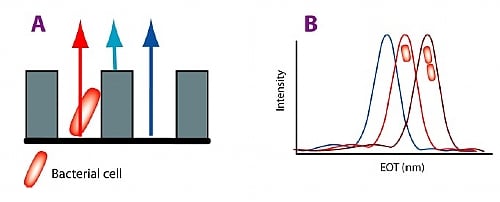Scientists from Israel have piloted a new silicon biosensor chip that can rapidly identify the best antibiotics for treating a bacterial infection.
Antibiotic resistance makes up one of the major health challenges of the 21st century. Some of the major causes of the increasing numbers of resistant bacterial strains are overuse of antibiotics and mistreatment of infections.
A new biosensor chip developed by scientists at the Israeli Institute of Technology in Haifa can direct clinicians to the best antibiotic treatment in only 2 to 6 hours. The new technology is being presented at the European Association of Urology congress in London this week.
The new chip consists of thousands of nanowells coated with a material that allows bacteria to stick to the chip. Using reflected visual light, the bacteria that are stuck to the wells can be counted and the growth of bacterial colonies can be monitored. By adding different antibiotics in various dilutions to each chip, it is possible to quickly identify which best inhibits bacterial growth — and it only takes between 2 to 6 hours!

So far, the team led by Professor Ester Segal has used the system to rapidly identify antibiotics for bacteria such as E. coli, which causes many urinary tract infections.
We are not yet at the stage where we can roll this out for routine clinical use. But the system is accurate, simple, economical, and significantly shortens the time to accurate treatment recommendation and will save lives in the future,” says Segal.
Urinary tract infections are a major health burden and especially many women suffer from recurrent infections caused by resistant bacteria. The new system could significantly cut the time needed to identify the correct antibiotic from a couple of days to a few hours. Using the correct antibiotics is key to preventing the rise of new resistant bacterial strains.
A recent UK report on antibiotic resistances estimates that by 2050 antimicrobial multi-resistance will be responsible for 10 million deaths, surpassing cancer as a leading cause of mortality. Several companies such as Discuva and Roche as well as BioVersys are actively developing new antibiotic drugs. However, tackling the major cause of the increasing resistances remains a top priority and requires rapid tests to prevent inappropriate antibiotic treatment.
Images via shutterstock.com / Maxx-Studio and segallab.technion.ac.il





